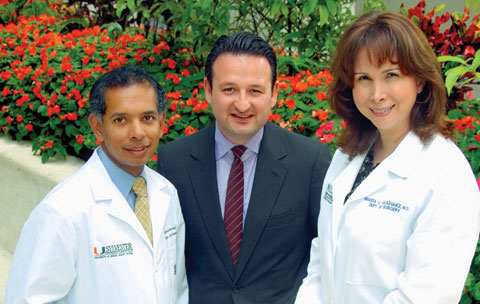 |
 |
Faculty Members Elected to Prestigious
Honor Society
Each and every day, whether in clinics or in labs, Miller School faculty work toward making sick patients better. They discover new therapies. They create new technology.
 |
| From left, Krishna V. Komanduri, M.D., Jochen Reiser, M.D., Ph.D., and Omaida C. Velazquez, M.D., were inducted into the prestigious American Society for Clinical Investigation. |
In April three Miller School physician-scientists were elected to the American Society for Clinical Investigation (ASCI), a prestigious group established in 1908 that is one of the nation’s oldest and most respected medical honor societies. The faculty members are: Krishna V. Komanduri, M.D., director of the Adult Stem Cell Transplant Program; Jochen Reiser, M.D., Ph.D., chief of the Division of Nephrology and Hypertension; and Omaida C. Velazquez, M.D., chief of the Division of Vascular and Endovascular Surgery.
Since members must be 45 or younger at the time of their election, their membership generally reflects research accomplishments made early in their scientific career.
“The ASCI considers the nominations of several hundred physician-scientists from around the world each year, and only elects up to 80 new members. To have three of those members be from the Miller School is truly an extraordinary accomplishment,” said Miller School Dean Pascal J. Goldschmidt, M.D., who traveled to the society’s annual meeting in Chicago for the induction ceremony.
In addition to building a leading clinical program in stem cell transplantation, Komanduri is performing research in human T-cell immunology. His research focus is in immune reconstitution after stem cell transplantation and human T-cell immunity to pathogenic viruses and fungi.
Reiser has made building a basic and clinical research enterprise for kidney disease and drug discovery a cornerstone of the Division of Nephrology and Hypertension. His own research is characterized by studies to discover the molecular basis of kidney failure and how diseases that lead to kidney failure can be tackled with novel treatments.
Velazquez has focused clinically on minimally invasive surgical approaches to various vascular diseases, while her basic science research has centered around wound healing. She is the principal investigator of an NIH-funded translational research laboratory that investigates different molecules that could make a difference in wound healing, along with using a person’s own bone marrow progenitor cells to increase healing.
|
 |
 |


